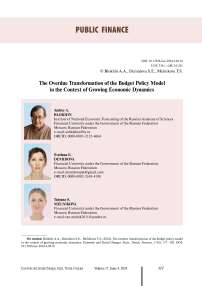The overdue transformation of the budget policy model in the context of growing economic dynamics
Автор: Blokhin A.A., Demidova S.E., Melnikova T.S.
Журнал: Economic and Social Changes: Facts, Trends, Forecast @volnc-esc-en
Рубрика: Public finance
Статья в выпуске: 4 т.17, 2024 года.
Бесплатный доступ
The changes taking place in the Russian economy under the influence of structural shifts and institutional transformations caused by external shocks determine the need to find a balance between budget planning and economic forecasting, taking into account the revealed differences in scenario approaches, deviations in the execution of the federal budget relative to planned assignments, weak connection between budget expenditures and subsequent socio-economic dynamics. It is proved that strong economic growth is associated with the liberation of the Russian economy from the dominance of foreign business in domestic markets. The problem is the discrepancy between conservative fiscal policy and the challenges of economic development, including the development of scenario conditions for a medium-term forecast for it. The unpreparedness of the public sector for high economic growth can become a brake on economic growth and institutional transformations. The directions of expanding the fiscal space in connection with the processes of adaptation of the Russian economy to external shocks are highlighted. These include differences between scenario conditions; between the GDP parameters adopted in the draft federal budget for the first fiscal year and the reporting values of this indicator at the end of the year, faster GDP growth compared with official forecasts; structural, transformational and institutional changes taking place in the Russian economy. To improve the quality of scenario forecasting underlying the development of the federal budget, it is necessary to include ambitious “target” and “crisis” scenarios in the scenario conditions developed by the Ministry of Economic Development of the Russian Federation along with conservative and basic ones. The clarification of the scenario conditions should be based on an assessment of the economic consequences of the implementation of budgetary policy measures. The composition of indicators of scenario conditions requires expansion. In addition to the current adjustments to the budget process, deeper reforms should begin to be worked out, corresponding to high economic growth and serious structural shifts in the economy.
Budget policy, fiscal space, economic forecasts, economic growth, budget expenditures
Короткий адрес: https://sciup.org/147245864
IDR: 147245864 | УДК: 336.1 | DOI: 10.15838/esc.2024.4.94.10
Список литературы The overdue transformation of the budget policy model in the context of growing economic dynamics
- Ahmad A., McManus R., Ozkan F.G. (2021). Fiscal space and the procyclicality of fiscal policy: The case for making hay while the sun shines. Economic Inquiry, 59(4), 1687–1701. Available at: https://doi.org/10.1111/ecin.13008
- Aizenman J., Jinjarak Y., Nguvenb Hien Thi Kim, Parkc D. (2019). Fiscal space and government-spending and tax-rate cyclicality patterns: A cross-country comparison, 1960–2016. Journal of Macroeconomics. 60, 229–252. Available at: https://web.archive.org/web/20200710045957id_/https://www.nber.org/papers/w25012.pdf
- Alesina A., Favero C., Giavazzi F. (2019). Effects of austerity: Expenditure- and tax-based approaches. Journal of Economic Perspectives, 33(2), 141–162.
- Auerbach A.J., Gorodnichenko Y. (2017). Fiscal stimulus and fiscal sustainability. NBER Working Paper. 23789. Available at: https://ideas.repec.org/p/nbr/nberwo/23789.html
- Blokhin A.A. (2019). Institutional rents in a multilevel economy. Problemy prognozirovaniya=Studies on Russian Economic Development, 4 (175), 16–27 (in Russian).
- Blokhin A.A. (2023). Economic dominance: Basic provisions of theory and measurement approach. Nauchnye trudy. Institut narodnokhozyaistvennogo prognozirovaniya RAN=Scientific Works: Institute of Economic Forecasting of the Russian Academy of Sciences, 1, 6–30. DOI: 10.47711/2076-3182-2023-1-6-30 (in Russian).
- Blokhin A.A. (2023). Global crisis as a crisis of economic dominance. Problemy rynochnoi ekonomiki=Market Economy Problems, 1, 32–47. DOI: 10.33051/2500-2325-2023-1-32-47 (in Russian).
- Demidova S.E. (2024). Formation of fiscal space in conditions of economic instability. Finansovye issledovaniya, 25, 1(82), 112–126. DOI: 10.54220/finis.1991-0525.2024.82.1.009 (in Russian).
- Eskindarov M.A., Maslennikov V.V., Abramova M.A. et al. (2022). Finansy Rossii v usloviyakh sotsial’no-ekonomicheskikh transformatsii [Finances of Russia in the Conditions of Socio-Economic Transformations]. Moscow: Prometei.
- Glaziev S.Yu. (2022). How monetary policy depresses economic growth in Russia and the European Economic Union. Rossiiskii ekonomicheskii zhurnal=Russian Economic Journal, 2, 4–20. DOI: 10.33983/0130-9757-2022-2-4-20 (in Russian).
- Igonina L.L. (2015). On approaches to assessing the effectiveness of fiscal policy. Mezhdunarodnyi zhurnal prikladnykh i fundamental’nykh issledovanii, 3, 54–58 (in Russian).
- Kose M.A., Kurlat S., Ohnsorge F., Sugawara N. (2022). A cross-country database of fiscal space. Journal of International Money and Finance. 128, 102682. DOI: https://doi.org/10.1016/j.jimonfin.2022.102682
- Kuvalin D.B., Zinchenko Yu.V., Lavrinenko P.A., Ibragimov Sh.Sh., Zaitseva A.A. (2024). Russian companies at the end of 2023: Recovering growth amid sanctions, worsening labor shortages and rising credit costs. Problemy prognozirovaniya=Studies on Russian Economic Development, 3(204), 164–181. DOI: 10.47711/0868-6351-204-164-181 (in Russian).
- Makhotaeva M.Yu., Nikolaev M.A., Demidova S.E. (2024). Factors of dynamics of own revenues of regional budgets. Finansy, 3, 17–24 (in Russian).
- Romer C.D., Romer D.H. (2019). Fiscal space and the aftermath of financial crises: How it matters and why. Brookings Papers on Economic Activity, 239–313.
- Romer C.D., Romer D.H. (2019). Phillips lecture – why some times are different: Macroeconomic policy and the aftermath of financial crises. Economica, 85(337), 1–40.
- Salamaliki P.K., Venetis I.A. (2024). Fiscal space and policy response to financial crises: Market access and deficit concerns. Open Economies Review, 35, 323–361. DOI: https://doi.org/10.1007/s11079-023-09724-7
- Shirov A.A., Belousov D.R., Blokhin A.A. et al. (2024). Russia 2035: A new quality of national economy. Problemy prognozirovaniya=Studies on Russian Economic Development, 2(203), 6–20. DOI: 10.47711/0868-6351-203-6-20 (in Russian).
- Sokolov I.A., Matveev E.O. (2023). Assessing the impact of fiscal policy on economic growth rate. Mir novoi ekonomiki=The World of New Economy, 17(4), 65–78 (in Russian).
- Sokolov M.M. (2023). Energy intensity of the Russian economy and the main factors affecting its level and dynamics. Ekonomika promyshlennosti=Russian Journal of Industrial Economics, 16(1), 34–50 (in Russian).
- Solyannikova S.P. (2022). Modern transformations of concepts and institutional frameworks of public sector financial management. Finansy, 9, 17–22 (in Russian).
- Sudarev D.A. (2023). Assessment of the impact of political factors on federal budget revenue forecast accuracy in Russia. Vestnik Instituta ekonomiki Rossiiskoi akademii nauk, 4, 197–216. DOI: https://doi.org/10.52180/2073-6487_2023_4_197_216. Available at: https://vestnik-ieran.ru/index.php/component/jdownloads/send/17-2023-n4-articles/124-vart-2023-4-p197-216 (in Russian).


